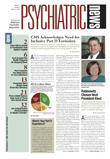How do you repair and sustain a therapeutic relationship with an angry patient? Therapeutic alliance has come to be recognized as crucial in every doctor-patient encounter and a critical factor in the outcome of psychotherapy. And this year, APA members attending the annual meeting in Toronto, will have an opportunity to sharpen their alliance-building skills in a course that has won awards at the Mt. Sinai Institute of Psychotherapy at the University of Toronto.
“Achieving and Sustaining Psychotherapy Effectiveness” is a full-day course that will seek to offer psychiatrists practical skills to improve psychotherapy outcomes through enhancing the therapeutic alliance.
Course codirector Paula Ravitz, M.D., told Psychiatric News that the course, which can be taken for six hours of continuing medical education credit, is designed to provide experienced psychotherapists with an expanded clinical repertoire to manage commonly encountered clinical challenges in contemporary psychotherapy.
Her co-director is Molyn Leszcz, M.D., of the University of Toronto, who is a coauthor with Irving Yalom of the newest edition of Interpersonal Psychotherapy.
Particular attention will be paid to the therapeutic alliance, effective use of countertransference, and therapeutic metacommunication, Ravitz said.
A distinguishing feature of the course will be the use of“ standardized patients”—typically, professional actors enacting patient roles in scripted scenarios.
At the opening of the course, a scenario will be enacted with faculty playing the role of the treating psychiatrist. The presentation is designed to be interactive—lending a “living theater” quality to the teaching—so that faculty may stop to make more transparent some crucial aspect that is being illustrated in the scenario or to allow course participants to ask questions.
Later, course participants will break into small groups in which patient-actors will enact separate scenarios for each group with participants playing the role of clinician.
Throughout, the emphasis will be on providing experience, not theory.
“We want to go beyond theory and give participants very practical approaches and strategies for commonly encountered clinical challenges related to the therapeutic alliance,” Ravitz told Psychiatric News.
She is director of the Mt. Sinai Psychotherapy Institute, head of the Interpersonal Psychotherapy Clinic at the Center for Addiction and Mental Health, and an assistant professor of psychiatry at the University of Toronto.
“The dynamic approach of this course is going to have an impact,” added Nancy McNaughton, M.Ed., director of the standardized patient program at the University of Toronto School of Medicine. “People will have a very clear memory of this class because it's practical and engaging.”
The course will enable participants to
•
Acquire an understanding of the evolution of contemporary psychotherapy and the central role of the therapeutic relationship.
•
Acquire an understanding of critical factors related to the effective establishment and maintenance of the therapeutic alliance.
•
Learn approaches that reduce the risk of therapeutic impasses and negative outcomes in psychotherapy.
•
Gain an appreciation for the effective utilization of countertransference and meta-communication.
Ravitz emphasized that the therapeutic alliance has come to be recognized as critical in all forms of therapy. “Our curriculum focuses on skills enhancement related to the therapeutic relationship across models,” she said. “Rather than focusing on the question of what works for whom, we focus on how to make whatever therapy is being employed work as effectively as possible. It's meant to be skill building rather than indoctrinating.”
And participants will be able to continue the learning experience after they leave the annual meeting. Through the University of Toronto Faculty of Medicine and Mt. Sinai Hospital Department of Psychiatry, Mt. Sinai Psychotherapy Institute, course participants can receive one-on-one distance supervision, allowing them to communicate problems, questions, and clinical vignettes through a confidential, password-protected Web site.
The course will be held Tuesday, May 23, from 9 a.m. to 4 p.m. in the Dominion Ballroom South on the second floor of the Sheraton Centre. Advance registration for APA members is $160.
Deborah Hales, M.D., director of APA's Division of Education and Career Development, urged clinicians to sign up.
“Our intention is to offer this as a CME exercise for experienced physicians to get a meaningful review of their interviewing technique with standardized patients under observation,” she said. “We want to begin to help practicing physicians realize that communication skills need practice, just as clinical skills do.” ▪

